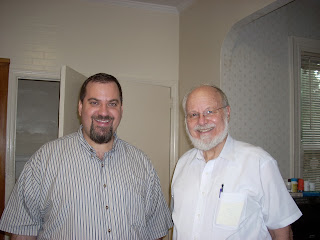A conversation about God
Pesach Sommer writes about how Orthodox Jewry often has problems discussing God.
My thoughts?
The Torah says that Hashem created us in his image, and there's been a lot of philosophical musings about the various meanings of that.
Ultimately, I think it's more accurate to say that we create God in our image. Not that God isn't real - I may doubt much of Jewish dogma, but I believe in Hashem. But part of what makes it difficult to speak about God communally in the Jewish community is that there are many Gods - or rather, many different perceptions of God. Hashem is an emotional concept. We each find our own path to him (or her) by perceiving God in a way that each of us can relate to - in our own image.
For some that's a grand king, though that concept is more difficult to relate to in a democratic age where people have the right of self-determination. For others it's a parent, sometimes loving, sometimes stern. For others Hashem is a friend, a confidante. Hashem is whatever your relationship with Him is.
For me, he's just an emotion, the connection I feel when I'm high on zmirot and spirituality - a partner in a feeling of something greater than just out humdrum lives. What Hashem really is, no one knows. So we are forced to relate in whatever way we can. But since there's less commonality in the perception of Hashem than ever, it's difficult to have a communal conversation when a common frame of reference is difficult to pin down.
My thoughts?
The Torah says that Hashem created us in his image, and there's been a lot of philosophical musings about the various meanings of that.
Ultimately, I think it's more accurate to say that we create God in our image. Not that God isn't real - I may doubt much of Jewish dogma, but I believe in Hashem. But part of what makes it difficult to speak about God communally in the Jewish community is that there are many Gods - or rather, many different perceptions of God. Hashem is an emotional concept. We each find our own path to him (or her) by perceiving God in a way that each of us can relate to - in our own image.
For some that's a grand king, though that concept is more difficult to relate to in a democratic age where people have the right of self-determination. For others it's a parent, sometimes loving, sometimes stern. For others Hashem is a friend, a confidante. Hashem is whatever your relationship with Him is.
For me, he's just an emotion, the connection I feel when I'm high on zmirot and spirituality - a partner in a feeling of something greater than just out humdrum lives. What Hashem really is, no one knows. So we are forced to relate in whatever way we can. But since there's less commonality in the perception of Hashem than ever, it's difficult to have a communal conversation when a common frame of reference is difficult to pin down.

Pardon my lateness--I'm playing catch-up with your blog--but I can't help thinking that being "high on zmirot" reminds me of Rabbi Mordecai Kaplan's concept of religious experience as "collective effervescence," a term that Kaplan apparently borrowed from French sociologist Emile Durkheim. See here:
ReplyDeletehttps://www.thecut.com/2017/01/why-being-part-of-a-crowd-feels-so-good.html